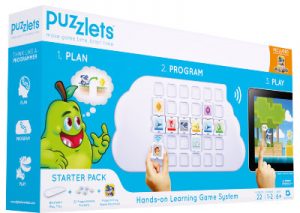 Primo Toys is a developer of educational toys for young children, which is headquartered in London. The flagship toy product offered by Primo is the Cubetto, a toy set designed for children between the ages of 3 and 7 which features a wooden robot and an interactive playset. Children place a series of colored blocks into the playset to build a set of instructions which the robot will follow to travel along the game board. This play experience is designed to teach children the basics of computer programming and coding in a tangible way.
Primo Toys is a developer of educational toys for young children, which is headquartered in London. The flagship toy product offered by Primo is the Cubetto, a toy set designed for children between the ages of 3 and 7 which features a wooden robot and an interactive playset. Children place a series of colored blocks into the playset to build a set of instructions which the robot will follow to travel along the game board. This play experience is designed to teach children the basics of computer programming and coding in a tangible way.
Cubetto has been earning a good deal of acclaim and Primo’s official website indicates that it’s used by more than 10,000 children in more than 90 countries around the world. Crowdfunding initiatives on both Crowdcube and Kickstarter have surpassed their funding objectives for the company. As of early July, Primo’s Kickstarter campaign had raised more than $1.5 million, a much greater amount than the $100,000 the company originally sought. Primo has reportedly said that the funds will be used on customer support, replacement units for customers, shipping and expanded services for educators. Primo was also a winner in the 2016 Cannes Product Design Lions for its Cubetto product.
Of course, success breeds competition and Primo isn’t the only company doing business in educational toys related to computer coding. Pittsburgh-based Digital Dream Labs offers a creative platform called Puzzlets which is also designed for children under the age of 7. Puzzlets games involve the use of an interactive “play tray” onto which children place tiles in a certain order to control the movements of a character in games on a computer or mobile device app. The play tray has a USB port to power a rechargeable battery and a circuit board which registers the commands based on tile placement which are then sent to a device via Bluetooth.
Given the similarities between these two educational game platforms, it should be of little surprise to anyone that an intellectual property dispute has arisen in recent weeks. In late June, Digital Dream Labs announced that it had filed a patent infringement lawsuit against Primo Toys to prevent it from shipping Cubetto orders to the U.S., which it had planned to begin this fall. Reports from the Pittsburgh Post-Gazette indicate that representatives from Digital Dream Labs e-mailed Primo Toys CEO Filippo Yacob in mid-May to express concerns over a patent held by Digital Dream Labs, but a reply from Yacob dismissed the patent as overly broad. The suit has been filed in the U.S. District Court for the Western District of Pennsylvania (W.D. Pa.).
 The patent-in-suit is U.S. Patent No. 9333427, entitled System and Method for Using Interconnecting Blocks as Input and Output for Electronic Devices and issued on May 10th of this year to Digital Dream Labs. It claims a method of providing data to a software application wherein a processor reads instructions from a number of first devices known as activity blocks which are placed within pockets of a second device known as a master block to form a grid, creates a data packet including the instructions and locations of those first devices and executes the software application with the data packet for output on an output device.
The patent-in-suit is U.S. Patent No. 9333427, entitled System and Method for Using Interconnecting Blocks as Input and Output for Electronic Devices and issued on May 10th of this year to Digital Dream Labs. It claims a method of providing data to a software application wherein a processor reads instructions from a number of first devices known as activity blocks which are placed within pockets of a second device known as a master block to form a grid, creates a data packet including the instructions and locations of those first devices and executes the software application with the data packet for output on an output device.
Digital Dream Labs’ complaint argues that the ‘427 patent protects its rights to a learning game or toy in which the physical arrangement of blocks on a board controls aspects of the game. Because the claim is directed at a method of communicating data and not the physical representation of a robot, it would seem that Digital Dream Labs has a compelling argument that Cubetto infringes upon its patent despite the fact that one uses a physical robot and the other an app interface. Although U.S. sales of Cubetto have yet to officially begin, the complaint alleges that Primo Toys has already shipped Cubetto units to American educational institutions.
More specifically, Digital Dream Labs alleges infringement based on four claims of the ‘427 patent. Claim 9 protects a data system interfacing with a software application which includes the first and second device elements, data packets including the sequential arrangements of first devices, and the processor. Claim 11 is related to sensors on the master block that detect the placement of activity blocks into device-readable cells. Claim 14 is related to a data system including the status of activity blocks in the device-readable cells. Claim 15 is related to a data system where data is updated based on the addition or removal of activity blocks from the grid of device-readable cells. Infringement of the ‘427 patent is the only count listed in the suit.
Primo’s response of the ‘427 patent is evidence of a dismissive attitude towards someone else’s intellectual property right. Again not shocking, but what is interesting is that this London based company has financial backing from an investor with a name very familiar to those following the American high tech industry: Zuckerberg. Randi Zuckerberg, the sister of Facebook Inc. (NASDAQ:FB) CEO Mark Zuckerberg, is listed under “Investors & Advisors” in the press room section of Primo Toys’ website. A frequent member of our Companies We Follow series, Facebook obtains a great many patents, 374 U.S. patents in 2015 alone. There’s no clear direct link between the two companies.
Corporate players in any sector of the toy industry will likely benefit from a market which has been expanding in recent years and looks set to continue to grow in the near future. Annual sales data released by the Toy Industry Association (TIA) shows that 80 percent of the U.S. retail toy market was worth almost $19.5 billion in 2015, a seven percent increase from the year before. Standardized to 100 percent of the market, the organization believes that the total American retail toy market was closer to $25 billion in 2015. Across the world, market research group Global Industry Analysts sees the global market for toys and games reaching $135 billion USD by the year 2020. In 2014, U.S. was fifth in per-capita expenditures on toys, trailing Australia, the UK, France and Canada. The Americas do rank as the fastest-growing market, however, with a compound annual growth rate (CAGR) of 9.4 percent. Both TIA and Global Industry Analysts see tech trends in the current toy and game market which are leading towards a more interactive gaming experience for kids.

![[IPWatchdog Logo]](https://ipwatchdog.com/wp-content/themes/IPWatchdog%20-%202023/assets/images/temp/logo-small@2x.png)



![[Advertisement]](https://ipwatchdog.com/wp-content/uploads/2024/04/Patent-Litigation-Masters-2024-sidebar-early-bird-ends-Apr-21-last-chance-700x500-1.jpg)

![[Advertisement]](https://ipwatchdog.com/wp-content/uploads/2021/12/WEBINAR-336-x-280-px.png)
![[Advertisement]](https://ipwatchdog.com/wp-content/uploads/2021/12/2021-Patent-Practice-on-Demand-recorded-Feb-2021-336-x-280.jpg)
![[Advertisement]](https://ipwatchdog.com/wp-content/uploads/2021/12/Ad-4-The-Invent-Patent-System™.png)







Join the Discussion
No comments yet.